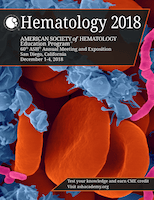
Hematology-American Society of Hematology Education Program
Scope & Guideline
Exploring Innovations in Hematological Science
Introduction
Aims and Scopes
- Advancements in Hematological Treatments:
The journal consistently publishes research on novel therapies and treatment strategies for hematological malignancies, including leukemias, lymphomas, and myeloma. This includes discussions on immunotherapies, CAR T-cell therapies, and bispecific antibodies. - Management of Hematological Disorders:
A significant focus is placed on the management of chronic and acute hematological conditions, including guidelines on managing complications like bleeding disorders, thrombosis, and transfusion reactions. - Transplantation and Cellular Therapies:
The journal covers topics related to hematopoietic cell transplantation, including indications, protocols, and outcomes. It also explores the evolving landscape of cellular therapies and their integration into treatment plans. - Clinical Guidelines and Best Practices:
Articles frequently emphasize the development and dissemination of clinical guidelines aimed at improving patient outcomes, addressing disparities in treatment access, and enhancing collaborative care between community and academic settings. - Emerging Research and Technologies:
The journal highlights innovative research methodologies, including molecular profiling, genetic testing, and the use of health technology to optimize patient management and treatment efficacy.
Trending and Emerging
- Immunotherapy and Targeted Therapies:
There is a significant increase in discussions surrounding immunotherapeutic approaches, including CAR T-cell therapy and bispecific antibodies, indicating a shift towards more targeted and personalized treatment strategies. - Long-term Outcomes and Survivorship:
Research focusing on long-term outcomes post-treatment, particularly in pediatric and young adult populations, is becoming more prominent, highlighting the importance of survivorship care in hematology. - Health Disparities and Access to Care:
Emerging themes include the exploration of health disparities in hematological treatment access, particularly among adolescents and young adults, aiming to improve equity in care. - Molecular and Genetic Profiling:
An increasing number of articles are dedicated to the role of molecular and genetic profiling in guiding treatment decisions, reflecting the trend towards precision medicine in hematology. - Management of Complications in Hematological Disorders:
There is a growing emphasis on the management of complications related to hematological conditions, particularly in the context of pregnancy and coexisting medical conditions, indicating a holistic approach to patient care.
Declining or Waning
- Traditional Chemotherapy Approaches:
There is a noticeable decrease in publications centered around classical chemotherapy regimens for various hematological cancers, indicating a shift towards targeted therapies and immunotherapies as preferred treatment modalities. - Generalized Treatment Protocols:
The focus on broad, standardized treatment protocols is waning as the field moves towards personalized medicine, emphasizing tailored approaches based on genetic, molecular, and individual patient factors. - Descriptive Studies without Novel Insights:
The journal has reduced the publication of studies that primarily describe existing treatment outcomes without introducing new insights or innovations, favoring articles that contribute novel data or perspectives. - Non-Hematological Conditions:
There has been a decline in papers addressing hematological aspects of non-hematological conditions, suggesting a narrowing focus on core hematological disorders and their direct treatments. - Outdated Diagnostic Techniques:
The journal has seen fewer articles on traditional diagnostic methods that are being replaced by advanced technologies such as next-generation sequencing and other molecular diagnostics.
Similar Journals

ANNALS OF HEMATOLOGY
Advancing hematological science through rigorous research.ANNALS OF HEMATOLOGY, published by Springer in Germany, stands as a premier platform for advancing knowledge in the field of hematology and medicine at large. With a significant impact factor and recognized rankings—Q2 in Hematology and Q1 in Medicine (miscellaneous) as of 2023—this journal is pivotal for researchers, clinicians, and students who are keen on exploring the latest developments in blood disorders, treatments, and innovative methodologies. Its broad scope encompasses original research, reviews, and discussions that aim to foster interdisciplinary dialogue, ensuring that the latest findings and theories are accessible to the scientific community. Although not an open-access journal, its rigorous peer-review process guarantees high-quality contributions, thereby solidifying its reputation as a vital resource in the hematological field. Founded in 1991, the ANNALS OF HEMATOLOGY continues to evolve, converging invaluable insights from both basic and clinical research until 2024. For those dedicated to improving patient outcomes and advancing hematological science, this journal remains an essential reference.

Hematologie
Connecting Researchers and Clinicians in HematologyHematologie is a highly regarded journal in the field of hematology, published by JOHN LIBBEY EUROTEXT LTD. With an ISSN of 1264-7527 and an E-ISSN of 1950-6368, this journal has established itself as a vital resource for researchers, clinicians, and students dedicated to advancing the understanding of blood disorders and treatments. Although the journal's coverage in Scopus was discontinued in 2018, it has continually provided invaluable insights and research findings. The journal aims to foster knowledge sharing and discussion in hematology, exploring innovative methodologies and emerging trends in the field. With a commitment to quality research, Hematologie remains an essential platform for disseminating critical findings that can drive clinical practice and influence future studies in hematological sciences.
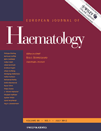
EUROPEAN JOURNAL OF HAEMATOLOGY
Exploring the Frontiers of Hematological ScienceEUROPEAN JOURNAL OF HAEMATOLOGY, published by Wiley, serves as a vital resource for experts in the field of hematology, focusing on the latest advancements in blood disorders and therapies. With an ISSN of 0902-4441 and an E-ISSN of 1600-0609, this esteemed journal has been disseminating knowledge since 1986 and continues to thrive, converging its visionary approach through to 2024. Notably, it holds a distinguished Q2 ranking in Hematology and an impressive Q1 ranking in the broader category of Medicine (miscellaneous) as of 2023, highlighting its significant contribution to the scientific community. With a Scopus rank of #45/137 and a 67th percentile in the field, the journal is recognized for its rigorous peer-reviewed research, making it an indispensable publication for researchers, practitioners, and students aiming to stay at the forefront of hematological studies. Though not an open-access journal, it ensures broad accessibility to critical findings via its subscription model, thus fostering an informed and globally engaged audience.
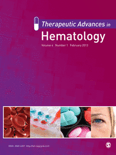
Therapeutic Advances in Hematology
Unlocking new horizons in hematological advancements.Therapeutic Advances in Hematology is a prestigious, peer-reviewed journal dedicated to advancing the field of hematology through innovative research and clinical studies. Published by SAGE Publications Ltd, this journal has become a vital resource for hematology professionals and researchers since its inception in 2010. With its impactful Q1 ranking in Hematology and a Scopus rank of 62 out of 137, it firmly establishes itself as a leader in disseminating significant findings and therapeutic approaches. The journal has been committed to open access since 2019, ensuring that its cutting-edge research is readily available to the global scientific community. Covering a broad scope of topics within hematology, Therapeutic Advances in Hematology is an essential platform for those seeking to enhance their understanding and implementation of therapeutic practices in hematological conditions. The journal embraces submissions from both clinical and laboratory perspectives, fostering collaboration and dialogue among researchers, clinicians, and students alike.

Blood and Lymphatic Cancer-Targets and Therapy
Exploring New Horizons in Cancer TherapyBlood and Lymphatic Cancer-Targets and Therapy, published by DOVE MEDICAL PRESS LTD, is a vital open-access journal that has been disseminating crucial research and findings in the field of hematology and oncology since 2011. With its ISSN 1179-9889, this journal focuses on the latest therapeutic targets and innovative treatment strategies for blood and lymphatic cancers, contributing significantly to the advancement of knowledge and practice in this specialized area. Designed for researchers, healthcare professionals, and students alike, Blood and Lymphatic Cancer-Targets and Therapy aims to foster a deeper understanding of cancer biology and promote collaborative efforts leading to novel therapeutic interventions. The open-access model ensures that research findings are readily accessible to a global audience, underscoring the journal's commitment to enhancing patient care and fostering educational growth in the cancer domain.
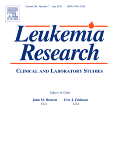
LEUKEMIA RESEARCH
Advancing knowledge in leukemia and hematological disorders.Leukemia Research is a prominent academic journal dedicated to advancing the field of hematology and oncology, focusing on the latest research developments related to leukemia and other hematological disorders. Founded in 1977 and published by Pergamon-Elsevier Science Ltd in the United Kingdom, this esteemed journal has established itself as a vital resource for researchers and clinicians alike. With an impressive impact factor and categorized in the top quartiles of Cancer Research and Hematology, it provides a platform for high-quality research articles, reviews, and clinical studies that contribute to a deeper understanding of leukemia's complexities. Although not an Open Access journal, Leukemia Research ensures widespread dissemination of knowledge crucial for developing innovative treatment strategies and improving patient outcomes. Researchers, professionals, and students in the fields of hematology and oncology will find this journal an invaluable asset in staying at the forefront of leukemia research, as it prepares to expand its impact through converged years of publication extending into 2024.

Experimental Hematology & Oncology
Advancing the Frontiers of Blood and Cancer ResearchExperimental Hematology & Oncology is a premier journal published by BMC, dedicated to advancing knowledge in the fields of hematology, oncology, and cancer research. Since its inception in 2012, this Open Access journal has emerged as a vital resource for researchers and healthcare professionals, fostering the dissemination of high-quality research that enhances our understanding of blood disorders and malignancies. With impressive rankings in Quarters 1 of key categories including Cancer Research, Hematology, and Oncology, it holds significant prestige, evidenced by its Scopus rankings: #42/404 in Medicine (Oncology) and #17/137 in Medicine (Hematology). The journal aims to publish cutting-edge studies, reviews, and perspectives that contribute to the evolution of therapeutic strategies and innovative treatment modalities. Researchers and practitioners alike will find this journal indispensable for staying at the forefront of breakthroughs in hematological and oncological research.

INTERNATIONAL JOURNAL OF HEMATOLOGY
Exploring Breakthroughs in Blood DisordersThe INTERNATIONAL JOURNAL OF HEMATOLOGY, published by SPRINGER JAPAN KK, serves as a critical platform for advancing research in the field of hematology. With a prestigious history spanning over three decades from 1991 to 2024, this journal is recognized for its impactful contributions, evidenced by its Q2 category ranking in Hematology for 2023, and its notable position at rank #71 out of 137 in the Scopus Medicine Hematology category. Researchers and professionals within the hematology community benefit from the journal's rigorous peer-reviewed articles that cover a wide range of topics, including clinical studies, basic research, and novel therapeutic strategies. Though currently non-open access, it provides essential insights and findings to an audience passionate about the latest advancements in blood disorders and treatments. Situated in Japan, the journal not only showcases high-quality research but also fosters a global exchange of knowledge in hematology, making it a significant resource for scholars, practitioners, and students alike.
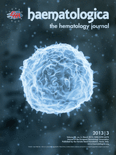
HAEMATOLOGICA
Pioneering Research in Hematology for Tomorrow's AdvancementsHAEMATOLOGICA, published by FERRATA STORTI FOUNDATION, is a prestigious journal in the field of hematology, recognized for its high impact and contribution to advancing research in this critical area of medicine. With an impressive Q1 ranking in the 2023 category of Hematology and a notable Scopus rank of #12 out of 137, the journal serves as an essential platform for disseminating innovative studies, clinical trials, and comprehensive reviews from 1947 to 2024. Based in Italy, with a commitment to quality and academic integrity, HAEMATOLOGICA fosters collaboration among researchers, practitioners, and students interested in the latest developments and methodologies within hematological science. Although it does not offer open access, the journal ensures that valuable insights are accessible through institutional subscriptions, emphasizing its role in shaping the future of hematologic research.

Journal of Blood Medicine
Unlocking Potential: Transforming Knowledge into Practice in Blood MedicineThe Journal of Blood Medicine, published by DOVE MEDICAL PRESS LTD, stands as a vital resource in the field of hematology, focusing on the latest research developments and clinical advancements in blood medicine. With an impact factor reflective of its growing relevance, this open-access journal has been delivering quality scholarly work since 2010, ensuring that critical research is readily available to the global scientific community. The journal operates under an open-access model, further enhancing its dissemination and accessibility to researchers, professionals, and students alike. In the 2023 rankings, it secured a Q3 category status within hematology and achieved a commendable 76th rank out of 137 in Scopus listings, indicating its commitment to quality and innovation in this specialized area. Located in New Zealand, the journal's diverse topics encompass clinical research, treatment modalities, and emerging therapies, contributing significant insights vital for shaping future advancements in blood medicine.